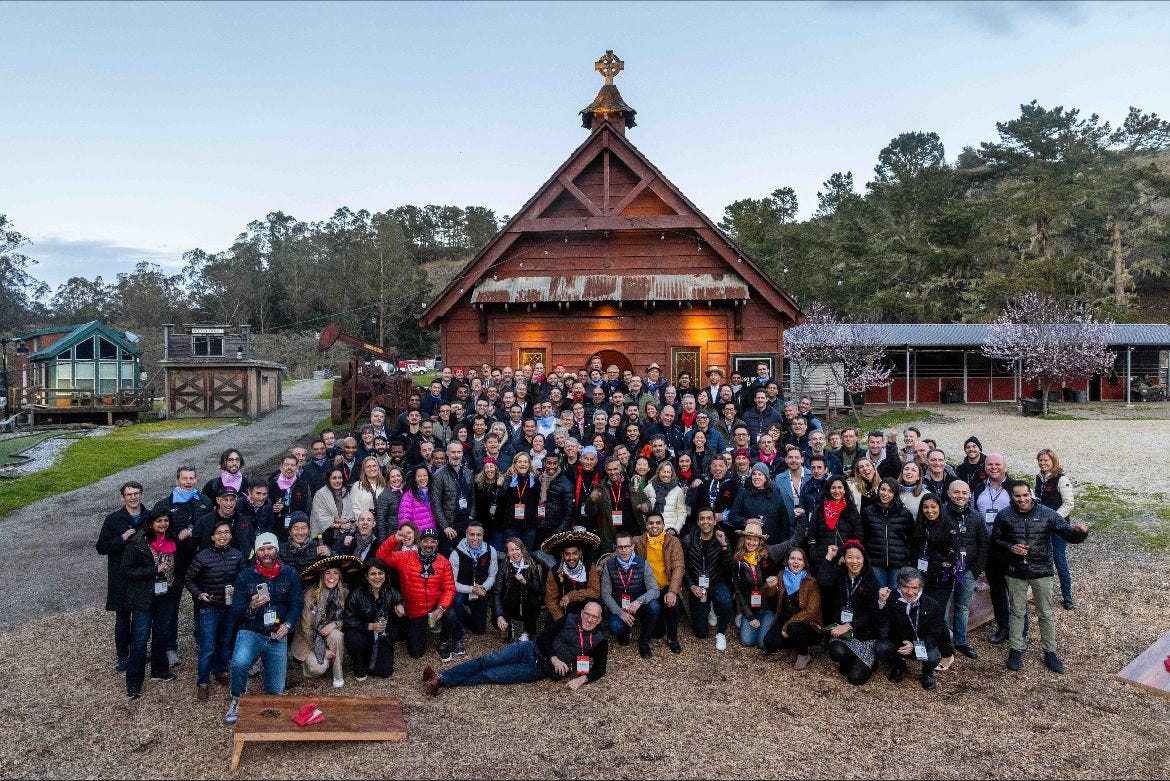Canada Dry: A Case for Further Revitalizing Canada’s Tech Scene
Hot takes on some of the roadblocks keeping the Canadian tech scene from reaching its full potential
Over the past few months, I was fortunate to spend lots of time in Canada, the Great White North and my home. Visiting my old stomping grounds is always a treat. I visited family and friends in Toronto and Calgary, satisfied my craving for Tim Horton’s, and of course met some awesome founders.
In late November, I checked out Startup Week in Calgary, where Sorenson Capital hosted a breakfast session for Alberta-based founders. This experience, coupled with last week’s C100 Summit in Half Moon Bay, was incredibly energizing. It also presented a valuable opportunity to compare the experiences of founders, operators, executives, and investors from Canada versus the U.S.
I am incredibly bullish on the future of Canadian tech. That said, my recent trips back home provided new insights into why Canada’s tech scene leaves more to be desired and many Canadian founders continue to struggle with access to capital and scaling their ventures.
Here are my hot takes on some of the roadblocks keeping the Canadian tech scene from reaching its full potential.
1. Smaller outcomes, thin equity
When a Silicon Valley-based company exits, there is, typically, plenty of money to go around. Lucrative, life-changing wealth enables C-level executives and maybe the first 50 employees to branch out into other pursuits. The CEO might start another company. The CTO and VP of Sales might join another startup. Others become angel investors. The positive spillover is substantial.
We know that outcomes of this magnitude are still rare in Canada. Moreover, I recently spoke with a founder who’s hired team members in both Canada and the U.S. He explained that most Canadian employees don’t value equity as much as their American counterparts, who tend to actively seek and negotiate equity compensation.
As a result, equity is spread thin in Canadian startups. When a Canadian startup exits, the positive contagion described above is limited in scope - to the C-suite and maybe the first few employees. The lack of understanding and deprioritization of equity among employees is the culprit.
2. A different breed of angels
Quality angel investors aren’t an endangered species in Canada. I’ve met plenty. But Canada doesn’t churn them out like Silicon Valley.
Most of the angels I know in the U.S. work or have previously built businesses in tech. They’ve battled in the startup trenches, understand the difficulty of getting a company off the ground, and are familiar with the high-risk, high-return nature of early-stage investments.
Given that Canada’s tech scene is somewhat infantile relative to Silicon Valley, many of its angel investors bring experience from cash-flow-oriented industries such as real estate, financial services, or natural resources - industries where wealth was traditionally created in Canada. Not to say these angels can’t offer general entrepreneurial wisdom, but the value-add for tech founders won’t be the same.
An angel with little to no experience in tech may also lack the requisite level of discernment. I’ve heard from Canadian founders stories of angels passing on pre-seed or seed investments, because “you don’t have product-market fit yet”. Silicon Valley angels, on the other hand, have a higher appetite for risk. They invest because they might personally know the founder, desire to see a different future state as a result of the product they are investing in, support the ecosystem, or simply pay it forward. They have a higher willingness to invest in outlandish visions or contrarian ventures, some of which turn out to be home runs.
3. Homogeneity precludes ingenuity
There is no shortage of success stories in Silicon Valley, nor is there a one-size-fits-all formula for how those startups got there. Around these parts, ask 10 people for startup advice and you’ll hear 10 different answers.
Canada’s smaller tech scene has fewer success stories under its belt. Advisors and investors are less experienced. (This will naturally get better over time.) With fewer battle-hardened founders or successful playbooks to look up to—at least compared to Silicon Valley—ask 10 people for startup advice and you might hear only 2 or 3 different answers. There are multiple paths to success. More creativity, heterogeneity of thought, and “deviances from the known path” in Canada’s tech scene will translate into more success.
4. Taking the “fun” out of government funding
On the surface, free government funding for startups sounds amazing, almost too good to be true. Canada, indeed, offers a plethora of grants and tax credits to founders in an effort to support its tech scene. The free, however, is a bit of a misnomer.
Countless hours spent filling out paperwork, opaque selection processes, and needing to demonstrate proper use of funds—even the less competitive grants are a chore.
Much of the government’s support is directed at R&D and deep tech. However, in my opinion, support, and funding for turning this R&D into a product and scaling it is just as important and impactful for the overall ecosystem.
Some entrepreneurs have solved the government grant Rubik's cube. That’s great! Accessibility and how well it is working is still a question mark.
5. Policymakers can’t keep up
The mega-merger sweepstakes are off and running in The Great North: Rogers acquired Shaw, RBC acquired HSBC, and WestJet is vying to buy Sunwing Airlines. This consolidation trend, which has accelerated over the past decade, doesn’t bode well for startup entrepreneurs. Instead of leveling the playground so that startups with disruptive technology can compete with incumbents, policymakers are allowing large companies to get larger and accrue unfair advantages.
Canadian universities generate valuable research and IP, but officials from these universities regularly travel down to Silicon Valley, pleading that all they need is founders willing to take the risk and spin this IP into successful ventures. With consolidation swinging the odds clearly in favor of the behemoths, you can’t blame doctorate fellows and startup founders for wanting to play it safe and lacking motivation. Swimming with elephants is hard.
Instead of launching their own companies, many Canadian PhDs and professors are leaving to join AI startups in the U.S. In the yearly State of AI Report by Nathan Benaich of Air Street Capital, the University of Toronto is, unsurprisingly, listed near the top of leading Brain Drain institutions.
6. A deceptively small market
Canada takes up a lot of space on the map, but this isn’t commensurate with the size of its economy. Except for a handful of consumer plays (e.g. Neo, Borrowell), Canada’s domestic market isn’t large enough to single-handedly and repeatedly churn out unicorns.
Most global VC firms group Canada into the “North America” category, so there isn’t a fixed and enduring allocation to Canadian, versus U.S., startups at these funds. (If you find one, let me know!) The same firms usually have a fixed allocation, hence dedication, to other major ecosystems, like Israel or the Nordic region. While many U.S. VCs travel to Canada regularly, the Canadian tech scene is still chronically underserviced.
It makes sense for Canadian startups to seek out customers across the border, but landing U.S. customers isn’t a sure thing. For instance, take a Canadian SaaS startup that sells to supermarket chains and retailers, like The Bay, Loblaw’s, and Aldo. These are blue-chip Canadian customers, but Nordstrom and Kroger don’t really see these Canadian counterparts as being “market-leading” or referenceable. Go-to-market (GTM) success in Canada doesn’t translate frictionlessly state-side; bagging your first referenceable U.S. customer is always a tough challenge, regardless of how physically close Canada and the U.S. are.
Belabored as this example may be, Israel exemplifies the small country punching well above its entrepreneurial weight. As soon as their ventures show promise, Israeli founders relocate or set up an office in the U.S. These companies look and feel local to U.S. customers. Israeli founders have shrewd GTM playbooks and instincts. This is something to aspire to for the Canadian tech scene.
7. Risky business
Canadians, specifically Canadian entrepreneurs, have traditionally been deemed more risk-averse than their international counterparts.
While it’s theoretical to peg risk aversion as a contributing factor in Canada’s tech scene still being far away from reaching its full potential, my conversations with Canadian founders support this claim. Many of these founders are building toward $50 million, $100 million outcomes—highly conservative compared to U.S. founders. Meaningful wealth for founders, sure, but it doesn’t excite venture investors.
Speaking of venture, it seems Canada’s risk-averse culture extends to VCs as well. If founders and VCs are both afraid to push their chips in deep, this only exacerbates matters.
8. Most Canadian wealth flows out of Canada
Most of Canada’s wealth is tied up in pension funds, such as Canada Pension Plan (CPP), Ontario Teachers’, PSP, and AIMCo. Very few of these funds (not counting Sorenson Ventures’ neighbor OMERS) have an active direct investment program focused on early-stage Canadian startups as an asset class. This contrasts sharply with their hyperactive direct investment programs in the private equity asset class. Funds they do allocate to VC merely flow through funds of funds (FoFs), which funnel the capital to brand name firms in Silicon Valley or abroad rather than the Canadian tech scene.
Imagine if a small fraction of all the Canadian wealth tied up in pension funds can go towards supporting the future of Canadian tech. It would easily yield 10x the benefits of any tax credit or grant program. I want to see the large Canadian pension funds do more to support homegrown founders.
Worry not, Canadians
Despite the concerns listed above, I am extremely bullish as they come on the future of Canada’s tech. I’m Korean by birth and Canadian by choice. I am forever humbled by the zeal and hard work put in by Canada’s talented entrepreneurs in or outside tech.
Consider these challenges potholes, not sinkholes. Nothing that can’t be smoothed out with some time and maturity. Becoming a tech “ecosystem” doesn’t happen overnight: Silicon Valley’s history dates back more than a hundred years.
Growing up in Toronto, it was rare to know anyone who worked in tech. My friends’ parents worked in real estate, financial services, or mining. The closest I had to tech was my friend’s dad who worked in IT at TD. In retrospect, it’s encouraging that Canada’s tech scene has developed exponentially over such a short span. Canada now boasts multibillion-dollar tech companies like Shopify, Neo, 1Password, and Sorenson portfolio company Visier among many others, plus well-attended conferences like Collision, and Superclusters.
I love bumping into Canadian founders in the Bay Area, but can’t help but think, “Why did they have to leave?”
My long-term goal is to make Sorenson a household name for early-stage software entrepreneurs in Canada, doing more to support talented founders, and adding to our existing slate of Canadian investments that includes Visier, Owl.co, Expeto and Boost. (This would also give me an excuse to spend more time in my hometowns of Toronto and Calgary.)
If Canada can button up even just a few of these “potholes,” the momentum will be palpable. And all of those naysayers? They’ll come around, too.





